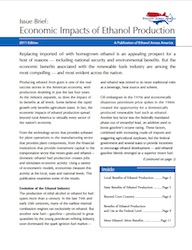The Ethanol Across America education campaign has released the Economic Impacts of Ethanol Production Issue Brief this week. The purpose of the report is to illustrate the significant benefits of ethanol production to the U.S. economy. The latest Brief in the series examines the impacts of several fuel ethanol facilities in the states including South Dakota, Iowa, Nebraska, and Indiana and shows how they are positively helping the economy.
“We have long been aware of the benefits of ethanol production at the local level, and the case studies we provide clearly quantify that. This brief also makes it clear that jobs resulting from the ethanol industry, both direct and indirect, fuel the economy at all levels,” said Douglas A. Durante, the director of the Ethanol Across America Campaign.
 According to the Brief, and citing a third party study, the ethanol industry added $2.9 billion of gross output to the U.S. economy in just 2009. It also highlights the reduction in Federal outlays for farm programs as well as the substantial energy costs savings. The Brief states that increasing the motor fuel pool with ethanol lowers the cost of gasoline to consumers and the potential for reducing oil imports could lower the U.S. oil bill by more than $60 billion dollars per year.
According to the Brief, and citing a third party study, the ethanol industry added $2.9 billion of gross output to the U.S. economy in just 2009. It also highlights the reduction in Federal outlays for farm programs as well as the substantial energy costs savings. The Brief states that increasing the motor fuel pool with ethanol lowers the cost of gasoline to consumers and the potential for reducing oil imports could lower the U.S. oil bill by more than $60 billion dollars per year.
The report also calculates that full implementation of the Renewable Fuel Standard (RFS2), which will largely be met with ethanol, could increase net farm receipts across the country by $13 billion per year. One case study illustrates that a 50 million gallon per year biomass ethanol plant in the Northeast would generate $170 – $200 million in income and create between 4,000 and 6,000 jobs during construction. Ethanol production from wood, agriculture residues, waste paper, and other cellulosic sources is being looked at in every state.
“Displacing imported oil, reducing health costs, creating jobs, reducing federal outlays– the list goes on,” said Durante. “With Congress and the Administration calling for a renewed commitment to producing domestic, clean energy, biofuels like ethanol make more sense than ever. With so many new members of Congress eager to look at these issues, we wanted to make this information available to them as they begin this new session.”

